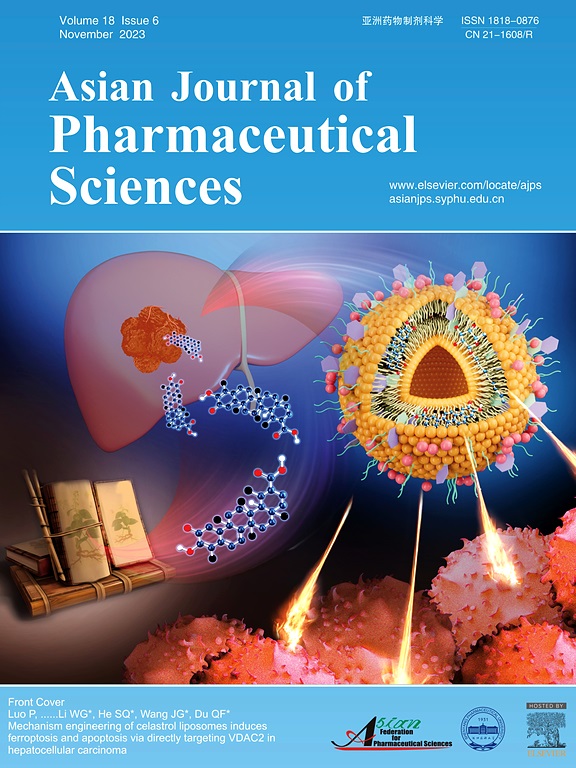微藻载纳米药物用于生物黏附给药治疗化疗引起的肠道损伤
IF 11.9
1区 医学
Q1 PHARMACOLOGY & PHARMACY
引用次数: 0
摘要
胃肠道毒性是化疗的严重不良反应,导致生活质量和生存率下降。例如,伊立替康(CPT-11)通常会引起严重的胃肠道毒性,缺乏有效的治疗干预措施,使治疗往往不可持续。因此,开发一种有效、安全的治疗方法对于提高化疗疗效和患者的生活质量至关重要。在这项工作中,我们开发了一种涉及螺旋形蓝藻微藻螺旋藻(SP)的新方法,以携带负载乙酸龙脑酯(BA)的壳聚糖纳米颗粒来增强药物在小肠中的保留。我们利用上皮细胞模型证明了BA对化疗诱导的肠道损伤的保护作用。在小鼠模型中,口服BA-ChNPs@SP在小肠中积累,并通过减少dsDNA释放和氧化应激来减轻炎症。这是伴随着肠道屏障的恢复和免疫微环境的调节。这项工作表明了微藻纳米药物治疗肠道疾病的前景,强调了其在解决化疗引起的胃肠道并发症方面的潜力。本文章由计算机程序翻译,如有差异,请以英文原文为准。

Microalgae-carrying nanomedicine for bioadhesive drug delivery for treating chemotherapy-induced intestinal injury
Gastrointestinal tract toxicity represents a serious adverse effect of chemotherapy, leading to reduced quality of life and survival. For instance, irinotecan (CPT-11) usually causes severe gastrointestinal toxicity, with a lack of effective therapeutic interventions, making treatment often unsustainable. Therefore, development of an effective and safe therapy is crucial for improving chemotherapy efficacy and the patients’ quality of life. In this work, we developed a novel approach involving the helical-shaped cyanobacterium microalgae, Spirulina platensis (SP), to carry the bornyl acetate (BA)-loaded chitosan nanoparticles to enhance drug retention in the small intestine. We demonstrated the protection effect of BA against chemotherapy-induced intestinal injury using an epithelial cell model. In a mouse model, orally administered BA-ChNPs@SP accumulated in the small intestine and attenuated inflammation by reducing dsDNA release and oxidative stress. This was concomitant with the restoration of the intestinal barrier and modulation of the immune microenvironment. This work suggests the promise of the microalgae-carrying nanomedicine strategy for treatment of intestinal diseases, emphasizing its potential in addressing chemotherapy-induced gastrointestinal complications.
求助全文
通过发布文献求助,成功后即可免费获取论文全文。
去求助
来源期刊

Asian Journal of Pharmaceutical Sciences
Pharmacology, Toxicology and Pharmaceutics-Pharmaceutical Science
CiteScore
18.30
自引率
2.90%
发文量
11
审稿时长
14 days
期刊介绍:
The Asian Journal of Pharmaceutical Sciences (AJPS) serves as the official journal of the Asian Federation for Pharmaceutical Sciences (AFPS). Recognized by the Science Citation Index Expanded (SCIE), AJPS offers a platform for the reporting of advancements, production methodologies, technologies, initiatives, and the practical application of scientific knowledge in the field of pharmaceutics. The journal covers a wide range of topics including but not limited to controlled drug release systems, drug targeting, physical pharmacy, pharmacodynamics, pharmacokinetics, pharmacogenomics, biopharmaceutics, drug and prodrug design, pharmaceutical analysis, drug stability, quality control, pharmaceutical engineering, and material sciences.
 求助内容:
求助内容: 应助结果提醒方式:
应助结果提醒方式:


